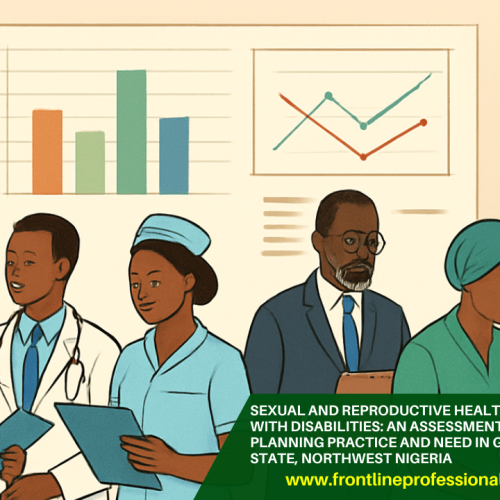Akaninyene Mark
Citation: Akaninyene Mark (2024) Knowledge, barriers and factors affecting the use of family planning methods among couples assessing care in Akwa Ibom State, Nigeria. Frontline Professionals Journal, 1(1), 141–160.
ABSTRACT
Background: Assessing couples’ knowledge, barriers and factors affecting the use of family Planning methods is crucial for understanding their reproductive health needs. Family planning is a critical aspect of reproductive health, allowing individuals to make informed decisions about their fertility and reproductive well-being. Married couples represent a key demographic for family planning education and services, making them a key demographic for family planning education and services. Family planning is essential for reducing maternal and infant mortality: By spacing out pregnancies, women can reduce their risk of maternal mortality and ensure better health outcomes for their children. Family planning enhances educational and career opportunities. Family planning allows young women to pursue their educational and career goals without the burden of unintended pregnancies. It also supports economic empowerment by enabling individuals to plan their resources effectively: Family planning enables individuals to plan their families and resources more effectively, contributing to economic stability and growth. Spacing pregnancies helps ensure better care for younger children. This study aims to assess knowledge, barriers and factors affecting the use of family planning methods among couples attending antenatal services in Akwa Ibom State, Nigeria.
Methodology: A hospital-based descriptive cross-sectional study design using a systematic sampling method to select 323 participants in Uyo LGA, Akwa Ibom State. Data were collated, analysed and presented using descriptive statistics with tables and frequencies. The majority 126 (39%) of the respondents are within 34-41 years. The majority (96.3%) of the men know about family planning methods for men. The majority of 258(80%) know the barrier method (male condoms). Most 181(56%) of the respondents have used family planning methods before. The factors that affect accessing family planning services for males is mostly stigmatization (57.6%). Accessibility, cost and poor interest are a few of the barriers to assessing family planning methods
Conclusion: Understanding the factors, and barriers that affect family planning methods among couples attending antenatal services in Akwa Ibom State, Nigeria, is essential for developing effective reproductive health programs and services. By assessing couple’s knowledge and identifying the barriers to family planning, healthcare providers and policymakers can work together to promote reproductive health and well-being among young adults in the region. It is therefore recommended reproductive health program designers incorporate these findings into reproductive health programs to help address barriers and factors affecting the use of family planning to improve the health outcomes among couples.
Keywords: Knowledge, Barriers, Factors Affecting, Family Planning Method among couples







